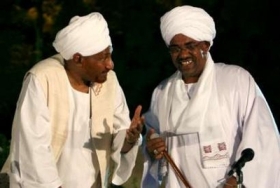Sudan communist party criticize agreement between Umma Party & NCP
May 26, 2008 (KHARTOUM) — The Sudanese communist Party (SCP) issued a statement today expressing disapproval of an agreement signed between the opposition Umma party and the ruling National Congress Party (NCP).

The Umma and NCP signed an agreement last week better known as “National Reconciliation Agreement” which largely outlines a number of fundamental principles that both sides share the same views on.
But the agreement received rebuke from a number of opposition political parties and even some Umma party members.
The SCP also said that the accord “enforces the idea of the religious state and a return to square one that the Ingaz [NCP] has started the September 1983 Shari’a laws from”.
The agreement contains a number of “religious principles” that include “affirming the role of religion as guidance to people”.
The opposition party further said that the election modalities outlined in the agreement “constitute a violation to what all the political parties agreed on including the SPLM and Umma party”.
“The agreement states that division of constituencies would be 50% on a geographical basis and 50% on relative representation which would be for the state and not to all Sudan.” the SCP said.
On Darfur the SCP said the agreement proposed “nothing specific on the demands by the Darfur movements and other national political parties”.
The NCP and Umma said that Darfur conflict “goes back to pre-independence era and intensified afterwards because of the lack of natural resources and administrative leaders and political injustices as well as development and service imbalance in the region”.
The SCP said that there need to be a “comprehensive national conference that brings together all parties and other society organizations to tackle all the country’s problems to reach a minimum agreement that enforces the unity and opens door to democratic transition and puts in place a program for balanced development”.
(ST)
